How to Find Good Suppliers on Alibaba | Your Complete Guide
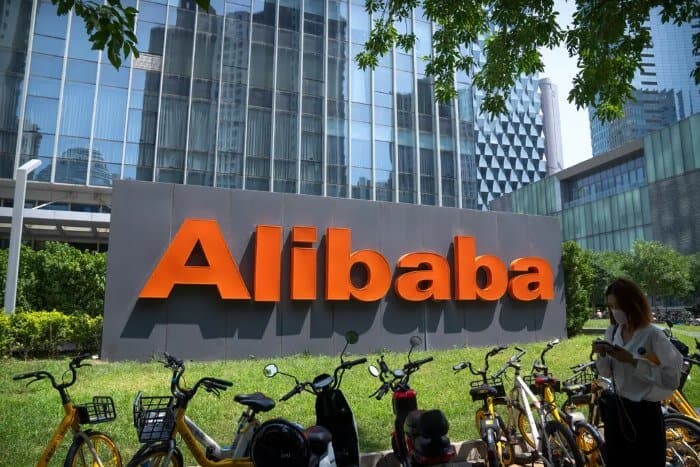
For over two decades, Alibaba has established itself as the world’s leading eCommerce platform for wholesale and B2B transactions. It continues to be the ultimate destination for wholesalers and online businesses to source quality, affordable products. However, you can’t just jump into this massive marketplace and start buying goods. You have to learn the ropes of finding the right suppliers, negotiating effectively, and avoiding scams on Alibaba.
Winsky is here to guide you through this journey. We have compiled several proven strategies for locating the best suppliers on Alibaba. This comprehensive article will walk you through every step, from sourcing to placing your first order on the platform. Let’s get started!
1. What is Alibaba?
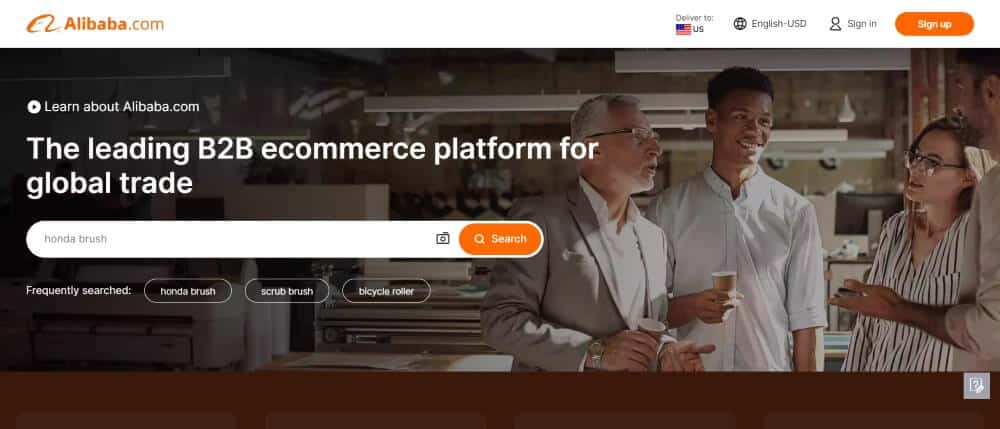
Alibaba is a popular global online marketplace based in China. Founded in 1999 by Jack Ma, it is an e-commerce platform for B2C and B2B services that connects Asian suppliers and manufacturers with buyers from around the world. Alibaba is a popular choice for businesses looking to source cheap products from China and sell in their own stores. Online retailers buy large quantities of goods at wholesale prices on Alibaba and resell them for higher prices on platforms like eBay, Amazon, Shopify, etc. Businesses can also create custom products from scratch using their own brand designs.
Why Choose Alibaba?
Every year, millions of businesses and retailers source their products from Alibaba. Here are the benefits they enjoy from this B2B eCommerce platform.
Cheap prices
The biggest advantage of shopping on Alibaba is the access to incredibly affordable products. Since you can connect directly with manufacturers, you avoid the costs of middlemen. This means you can purchase bulk goods at very discounted prices and make more profits when you resell them.
Millions of Products and Suppliers
On Alibaba, you have access to millions of products and suppliers in one marketplace. You can find almost every product you need across several categories, from clothing to electronics, household supplies, and machinery. The platform welcomes all types of suppliers from any niche, giving you access to finding unique products that might not be available in your country. A simple product/supplier search on Alibaba will reveal thousands of reliable suppliers to choose from.
Easy to use
Another important selling point of Alibaba is its user-friendly website. Anyone can conveniently browse through its products, manufacturers, and suppliers database. All suppliers and products are arranged in categories, so users can quickly find the products they need. Simply enter your product keyword into the search bar at the top of the website and use the filters to narrow down your results. The website also offers language translation features to easily communicate with suppliers.
Allows customization of products
Alibaba fully supports the customization of products. Many businesses source goods from the platform and add their brand labels to make it unique. You can reach out to the best Alibaba manufacturers to create custom-made goods branded with your company’s name. All you need to do is provide your product name, logo, and specific design requirements.
Safe and guaranteed for buyers
Alibaba provides supplier verification tiers to help buyers recognize trustworthy suppliers. You can select from verified supplier Alibaba, trade assurance, or gold suppliers with a proven track record. If a supplier or manufacturer fails to meet the product requirements, Alibaba offers a guarantee system where buyers can request a refund. You can also use Alibaba’s escrow services to make initial deposits and then final payments after receiving the products.
Global Payment options
Alibaba supports various popular payment solutions to facilitate global transactions. You can use options like PayPal, Alipay, credit cards, Western Union, and bank transfers to conveniently make payments on the platform.
Types of Suppliers on Alibaba
There are three types of suppliers you’ll meet on the Alibaba platform. Knowing how to differentiate them will determine how much you pay for products on the platform.
Wholesalers
Wholesale suppliers buy products in bulk from several manufacturers and resell them in smaller quantities. They often have low MOQ requirements, allowing you to buy smaller volumes of products. However, products bought from wholesalers are always more expensive, and you should try your best to avoid these suppliers on Alibaba.
Trading Company
Most suppliers you’ll find on Alibaba are trading companies. These businesses act as intermediaries, sourcing products from manufacturers and reselling them without actually manufacturing the products themselves. Working with a trading company can be beneficial because they can offer lower MOQs than you might get if you negotiated directly with a factory.
Manufacturers
A manufacturing company produces the products they sell in their factories. They usually focus on specialized products rather than a variety of products due to cost and production capacity constraints.
Although they set high MOQs, the best sellers on Alibaba are Manufacturers. They give you the lowest prices per unit, which helps to maximize profits. You can also customize their products and packaging with your own branding.
Distinguishing Between Manufacturers and Middlemen on Alibaba
Alibaba does not mandate suppliers to specify whether they are manufacturers, trading companies, or wholesalers on their site. Follow these steps to differentiate them:
- Check the product catalogue– A company that sells several unrelated products is most likely a middleman. Manufacturers are usually specialized in a product category. For example, if you see a company that sells both baby diapers and electronic gadgets like microwaves, you’re probably dealing with a wholesaler.
- Ask Product questions– Manufacturers usually have in-depth knowledge about their products and can provide a comprehensive overview of the production process. Wholesalers and trading companies will not have enough knowledge about the products they sell.
- Pay for an external inspection– If you’re unsure about buying from any supplier, you can hire a reputable freight forwarder like Winsky Freight. We will perform checks on your potential suppliers and confirm the legitimacy of their factories.
2. How to Find a Good Supplier on Alibaba
Alibaba is home to over 200,00 suppliers, making it a great place to find a seller who has exactly what you need, regardless of your niche. However, the huge number of suppliers can also make it challenging to identify the right one.
A good supplier must be able to produce high-quality products that meet your exact product specifications and have excellent communication skills. Here are some tips for finding a good supplier on Alibaba:
1. Define your product needs
Without knowing exactly the kind of product you need, you’re unlikely to get great results on the Alibaba platform. You need to clearly understand what products you’re looking for, including details like specifications, quantities, and quality standards.
2. Search using specific keywords
You can choose between searching for products or searching for suppliers on Alibaba. We recommend you select “suppliers” rather than “products” before beginning your search. Running a suppliers search works exactly the same way, but this time you get a list of suppliers rather than products.

Always use focused keywords that accurately describe what you’re looking for on the search bar. For example, searching for “men’s running shoes” could yield over a hundred thousand results. To narrow down your search, use specific and relevant keywords that detail the material type, color, shape, and other characteristics you’re seeking.
Adding extra keywords like “cotton” or “blue” to your search can help you find suppliers that offer exactly what you want. As you type keywords into the search bar, Alibaba also provides suggestions based on what other users have searched for.
3. Understand Alibaba’s Supplier Verification Types
There are three categories of suppliers we want you to prioritize on Alibaba.

A. Gold Supplier
When selecting potential suppliers on Alibaba, the first step is to check if the seller has a Gold membership status. The Gold Supplier tier is the most accessible membership offered to suppliers on Alibaba. This status indicates that the company has paid an annual membership fee
A verified gold supplier must pass an onsite inspection conducted by an independent third party to confirm the legitimacy of its business operations. However, some bad suppliers still pay for the gold supplier badge, so it’s not always a guarantee of quality. You can filter for Gold Suppliers by clicking on the “Supplier Type” filter option when making searches.
B. Verified Supplier
Alibaba Verified Suppliers have passed thorough audits and inspections by independent third-party institutions, both online and offline. This rigorous assessment process ensures they meet certain quality standards to earn the “Verified” blue badge on their profile. Asides this, verified suppliers also pay substantial amounts to get the badge, which screens out fraudulent companies.
Verified supplier inspections involve:
- Checking the supplier’s company profile, manufacturing license, and factory information.
- Assessing the company’s production capacity, R&D capabilities, and quality control procedures.
- Conducting photo and video inspections of the company’s factory.
You can access the complete verification report of any supplier on their profile page, including photos of the company. Alibaba’s VR Showroom technology also offers a virtual tour of a supplier’s factory or warehouse, giving you an up-close view of their facilities.
C. Trade Assurance Supplier
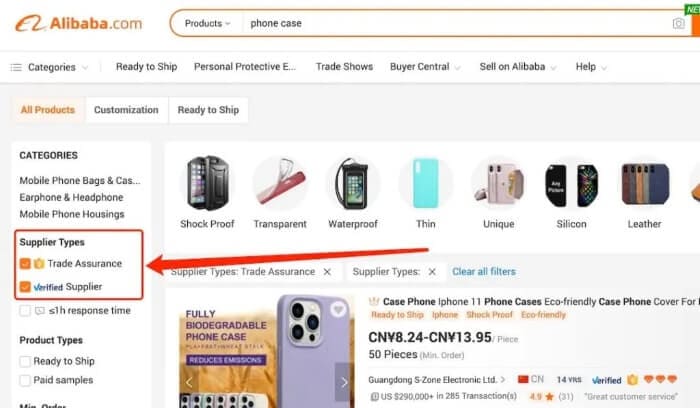
Alibaba’s Trade Assurance program is a free service that provides additional protection for buyers in case of disputes related to product quality or shipping delays. Alibaba acts as an intermediary during transactions to ensure that suppliers meet their obligations. When you buy from a Trade Assurance supplier, you’re eligible for compensation if the supplier breaches the contract terms. This program also helps to secure payments made on the platform.
You must take extra care on Alibaba if your preferred supplier isn’t covered by trade assurance. You can use the “Trade Assurance Supplier” filter under “Supplier Types” to find such suppliers.
4. Sending an RFQ (Request for Quotation) on Alibaba
Apart from directly searching for them, another effective method to connect with suppliers on Alibaba is by posting an RFQ.
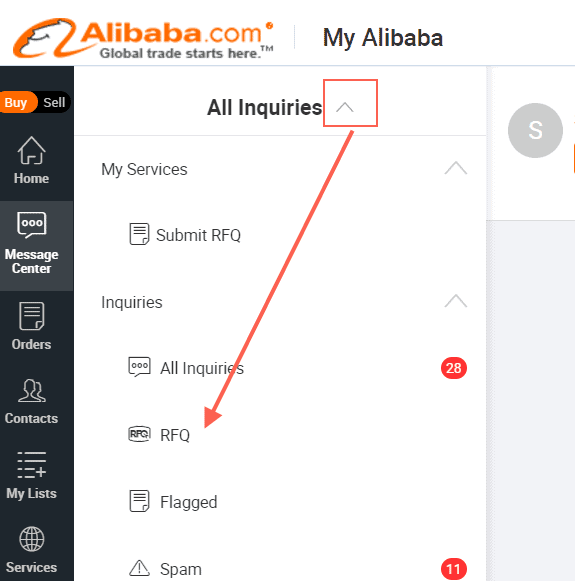
5. In-depth Profile Review
You should examine the supplier’s business profile, focusing on their experience, main products, and customer reviews. A good supplier profile should give an overview of the supplier’s business type, product descriptions, pricing, MOQs, company images, certifications, company history, among other things. If the supplier profile looks disorganized with unclear product images, it may not be a good sign. Below is a step-by-step guide on what to look for on the profile page.
A. Company Name
The supplier’s name can reveal much about the company and help you know whether they’re a trading company or a manufacturer. Professional suppliers usually use names that include the city or province where the factory is located and the type of products they manufacture. If the name contains terms like “trading,” “import,” “export,” or generic descriptions, you might be dealing with a middleman.
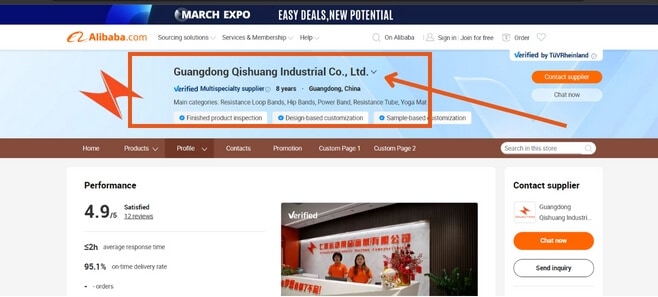
B. Company Age
Always prioritize companies with more experience on Alibaba, preferably, five years upwards. A long business history indicates you’re dealing with a reputable manufacturer with solid QA and QC systems. Such companies are also likely to have good customer relationships and logistics management practices.
C. Company Address
The location of a supplier can provide valuable insights into the company. The address tells you whether the factory is located in an industrial cluster where there are other manufacturers producing similar products. Companies in these clusters enjoy government incentives, access to skilled labor, and lower-cost materials. This means you can get quality products at more affordable prices from these suppliers. If a company is not located in such a region, it might be a trading company or could have higher prices due to its location.
Additionally, knowing the supplier’s address also informs you about their proximity to transportation ports. You don’t want a supplier that is too far inland to reduce shipping costs.
D. Export History
Having a supplier with experience exporting goods to your country or region is always beneficial. For example, you can use the “West Europe,” “North America,” or “Asia-Pacific” filters in your supplier search to indicate that you are specifically interested in suppliers that have previously exported goods to these parts of the world.
E. Check out customer reviews
Customer reviews provide insights into the experiences of other buyers with a particular seller. However, be cautious when checking reviews, as some suppliers post fake reviews on their product pages.
F. Check the product catalogs
As you explore the supplier’s profile page, pay attention to the way they present their products. Professional suppliers have well-organized product catalogs that match their business portfolio. For instance, if a supplier specializes in selling “kitchen appliances,” their product listings should feature related items like “blenders” and “toasters.” Middlemen or unprofessional sellers are more likely to have unrelated products on their page.
G. Evaluate the Supplier’s Certifications and Facilities
Verify that the supplier has the necessary certifications and accreditations that attest to their quality standards and reliability. For example, if you’re buying food products or pharmaceuticals, your supplier needs compliance certificates for export to certain countries, such as FDA approval for the United States.
You can also request a video call to tour the factory and observe the workers in action. This helps you verify their production capacity and confirm that the supplier is indeed manufacturing the products themselves.
H. Verify the Company’s Background with a Google Search
After thoroughly reviewing a supplier’s Alibaba page, it’s wise to extend your research beyond the platform. Conduct a quick Google search to gather additional information about the supplier in question. If the supplier lacks an official website, look for any news articles that might indicate potential scams or other problems.
With all these checks, you should be able to filter out companies that don’t align with your requirements.
3. How to Communicate and Negotiate with Alibaba Suppliers?
Communicating with Suppliers
After narrowing down your list using the above tips, contact potential suppliers to discuss your needs, ask questions, and assess their communication skills. Remember, not all suppliers on Alibaba speak fluent English, so make your inquiries clear and concise to avoid misunderstandings.
Here are some questions to ask suppliers on Alibaba:
- How long does production take?
- Can you describe your production and quality control processes?
- How many workers and machines do you have in your facility?
- What certifications do you hold?
- Do you have minimum order quantity (MOQ) requirements?
- Which countries do you export to?
- Can you provide references from previous buyers?
Negotiating with Alibaba Suppliers
It’s perfectly normal to bargain with Alibaba suppliers on price, quality, quantity, product specifications, and delivery time.
Price- Learning to negotiate with the best sellers on Alibaba can lead to significant cost savings. Based on your communication with other suppliers, you should have an average price for your product, which will serve as a benchmark during negotiations. If you receive a lower price from one supplier, use that price as leverage when negotiating with the next supplier. Continue this process until you achieve the lowest possible price per unit.
However, ensure that your negotiations are respectful and reasonable. Be cautious if a supplier agrees to a very low price, as they might compromise on material quality. Instead of only focusing on the price, consider asking for discounts in other areas, such as reduced prices for larger orders or a discount for upfront payment.
Minimum order quantities (MOQs)- While it’s true that many Alibaba manufacturers have high MOQs, it’s still possible to negotiate for smaller orders. If you have a limited budget, discuss to see if the supplier can lower the MOQ requirements for you.
Manufacturing duration- If you’re not comfortable with the supplier’s production timeframe to get your goods ready, negotiate with them to see if you could get it faster.
Payment terms- Many suppliers prefer receiving payment in advance, but this may not be favorable for you. Instead, you can negotiate for more favorable terms like using a letter of credit, escrow services, Alibaba’s Trade Assurance, or PayPal. We often recommend that you pay 30% upfront and the remaining balance upon delivery. If your supplier is not comfortable with this, continue negotiating until you reach a mutually beneficial agreement.
Shipping Incoterms- Finally, you should understand what type of incoterm your supplier operates. For new buyers, the DDP or DDU incoterms may be preferable because they require the seller to handle shipping and customs duties, until the goods reach your doorstep. Experienced buyers may use the FOB, EXW, CIF, or other incoterms. Not every supplier offers these terms, so you should discuss your options with them.
If you’re not satisfied with the shipping terms offered by your supplier, do not worry. You can hire Winsky Freight as your freight forwarder to manage all aspects of shipping logistics from the supplier’s warehouse to your final destination.
Request for Samples
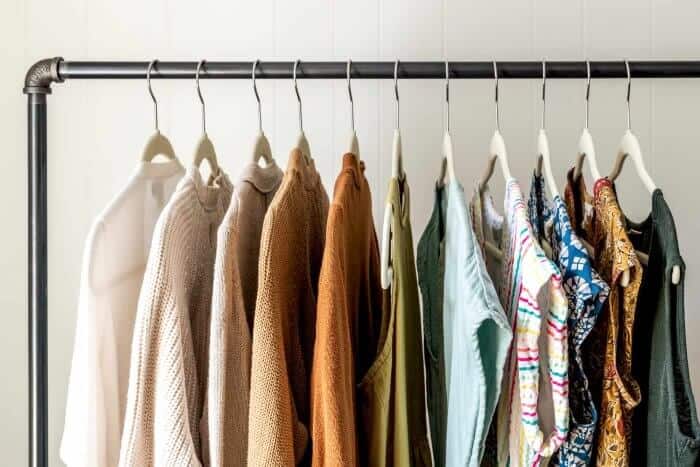
Don’t ever place a large order on Alibaba without requesting samples first, unless it’s from a supplier you’ve worked with before. Samples allow you to access the product quality firsthand and determine whether the supplier understands your product requirements. Although samples may cost higher per unit, it is preferable to buying large volumes of unsellable goods.
Evaluate the quality of the samples you receive, including the materials and construction. Check for any defects and test the products personally to be sure they function properly. Requesting samples also gives you an idea of the shipping times compared to the supplier’s estimates. This is important for products with short expiry dates or fragile goods.
Finally, ensure the product packaging is strong enough to protect the product from potential delivery mishaps, such as falls. If you’re a business that ships goods directly from the supplier to distributors or retailers like Amazon FBA merchants, then pay special attention to product packaging.
Not all Chinese suppliers are eager to send samples because many buyers request samples and never end up buying. During negotiation, let the manufacturer know you plan to place a large order, so they’re encouraged to send samples. Some manufacturers may even offer samples for free!
4. How to Avoid Being Scammed on Alibaba?
Although Alibaba has implemented measures to connect buyers with trustworthy suppliers, there are still scammers that slip through the cracks.
Common Pitfalls on Alibaba
Be aware of some common tactics used by Alibaba suppliers:
- Offering low prices at the expense of product quality.
- False compliance and product certifications that are not genuine.
- Selling fake branded products.
- Unexpectedly raising prices after reaching an agreement.
- Providing high-quality samples but delivering inferior final products.
- Reducing product quality in subsequent orders.
- Long shipping delays.
- Changing product materials
Tips to Avoid Scams on Alibaba
Follow these guidelines to avoid these pitfalls on Alibaba
- First and foremost, if the price seems too good to be true, it probably is. Avoid sellers who offer products at significantly lower prices than the market average.
- Do not buy from free account members, no matter how convincing their profile page looks. High-quality sellers usually have a Gold or Verified tag.
- Beware of branded products on Alibaba because most of them are fake. Major brands like Gucci, Adidas, Nike, etc. do not sell their products on Alibaba.
- Prioritize dealing with suppliers that have a Gold Membership
- As much as possible, only use suppliers with a long history on Alibaba.
- Always ask for samples
- Use Alibaba Trade Assurance, escrow services, or PayPal for payments. Be wary of suppliers demanding full payment upfront or requesting payment via Western Union.
- Request and verify the supplier’s business documents before placing an order.
- Avoid suppliers who frequently change their contact or payment details.
- Keep options open and discuss with multiple sellers at a time so you can switch suppliers if needed.
- Use a third party inspection company to review your goods before shipping. Winsky Freight can help you run a comprehensive product quality check at the supplier’s warehouse before you finalize payment.
Finally, don’t take unnecessary risks when making large orders. Exercise full caution and take your time to find the right supplier.
5. Place Your First Order
At this stage, you must have found a supplier and be ready to place your first order. If you don’t need the goods urgently, consider starting with a trial order. Placing a smaller order allows you to test the supplier’s reliability and product quality once again before committing to larger purchases.
FAQs
What is the difference between trade assurance and verified supplier?
Trade Assurance is a free service provided by Alibaba to safeguard your transactions. Under a trade assurance agreement, you’re eligible for compensation if the supplier breaches the contract terms.
On the other hand, Verified Supplier status is a badge awarded to suppliers who have undergone thorough inspections and verification by Alibaba and independent third-party institutions, confirming their legitimacy and trustworthiness.
How do I find the right supplier on Alibaba?
To find the right supplier on Alibaba, start by searching for the product you need and then vet suppliers based on their company profile and customer reviews. Request quotes, ask for samples, and communicate clearly your product requirements. Consider suppliers with Trade Assurance and Gold or Verified Supplier status for added security.
What are the payment options on Alibaba?
Payment options on Alibaba include Trade Assurance (which covers credit/debit cards, bank transfers, and online bank payment), wire transfer (T/T), Western Union, and PayPal. Different suppliers may choose different payment methods.
Conclusion
Congratulations on making it to the end of this article! We believe this step-by step guide has equipped you with the essential knowledge to find a supplier and place your first order on Alibaba. Remember, the success of your business heavily depends on choosing the right Alibaba supplier. So, carefully evaluate each potential supplier and pick one that meets your product specifications, has a strong reputation, offers affordable products, and has excellent communication skills.
If you need assistance with shipping your goods from China, Winsky Freight is here to help. We’ll streamline your logistics process from your supplier’s warehouse to your destination anywhere in the world. Contact us today to get a quote and simplify your shipping experience.
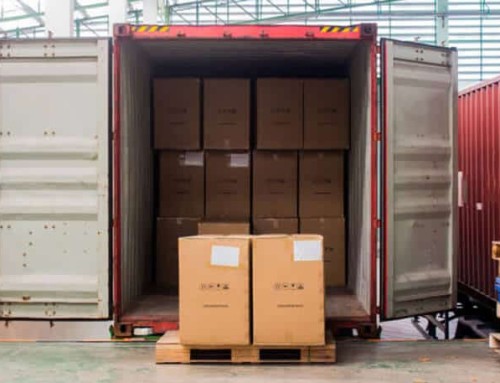
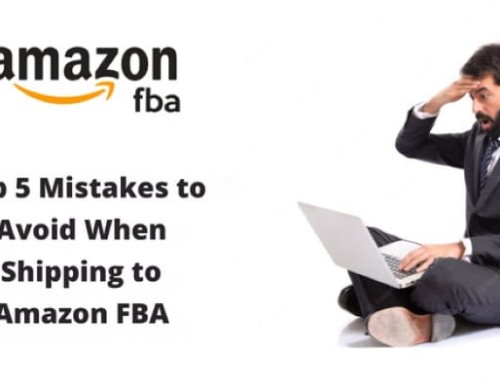
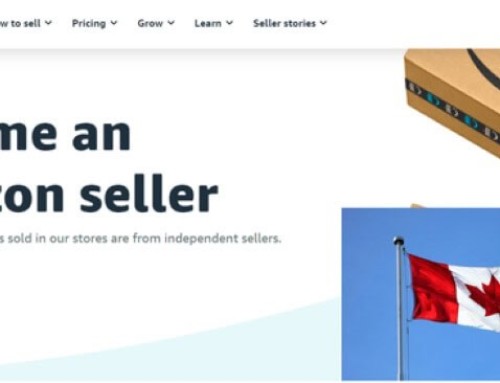
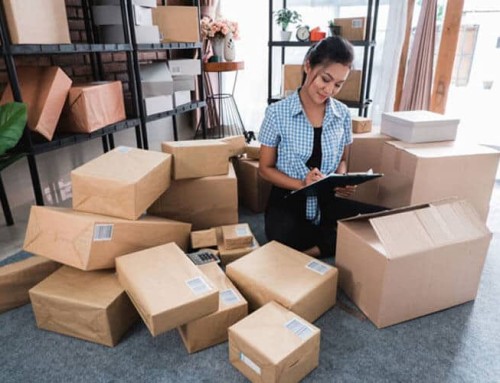
Leave A Comment